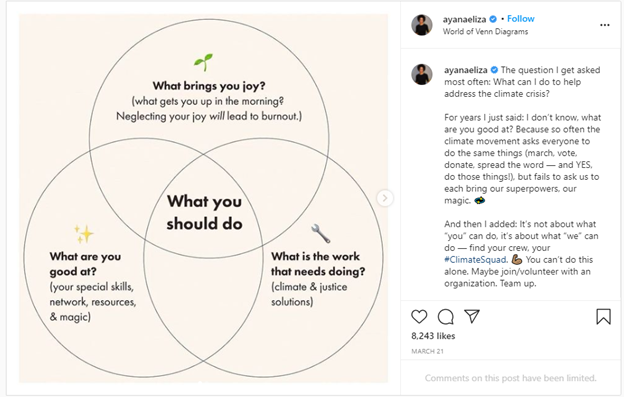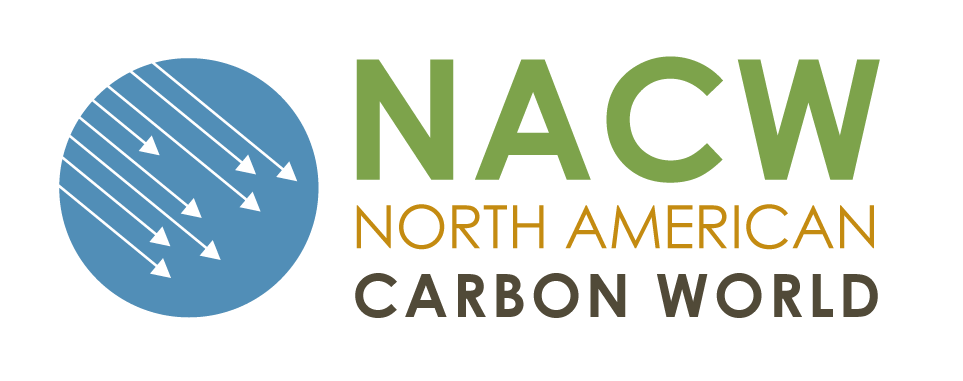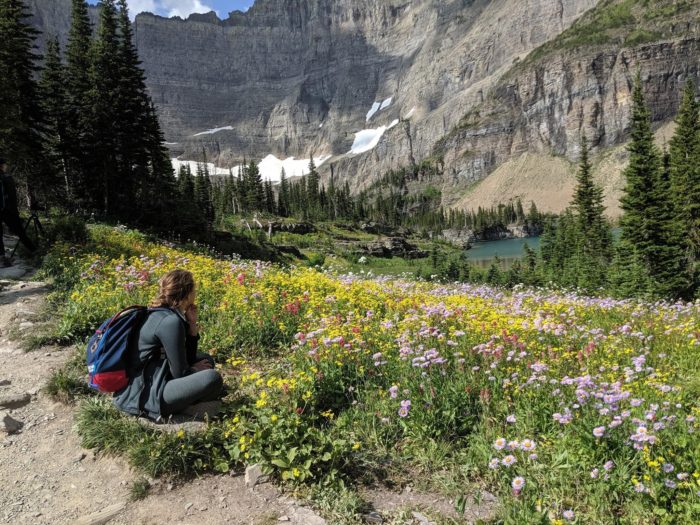1. What drives your environmental work and activism?
The belief that everyone deserves to live and flourish on a healthy, thriving planet including future generations to come.
2. What was one of your most exciting and rewarding achievements?
Completing my Climate Corps Fellowship with the Los Angeles Community College District. I learned so much about connecting with different stakeholders to help them identify effective climate action strategies and built really meaningful relationships along the way.
3. What are your favorite and frequently visited climate or news sites, and why?
My personal favorites for climate news are The Guardian, Grist, Vox, Resources for the Future, and Sammy Roth’s Boiling Point newsletter for the L.A. Times. They all provide digestible and engaging content about complex climate crisis issues and how they intersect with other social and political problems we face.
4. What is a tip you’d like to share for leading a more sustainable life?
I’d say try finding the most sustainable way for you to be sustainable. Identify actions for yourself that are easy, free/save money, and that you enjoy so you’re able to keep them up in the long run. Dr. Ayana Elizabeth Johnson, founder of the Urban Ocean Lab think tank to help coastal cities adapt to climate change, cohost of the podcast How to Save a Planet, co-founder of the All We Can Save Project, and one of my personal heroes, created this really great graphic back in March of this year designed to help anyone get started with taking climate action:

We all have a part to play (some greatly more so than others), so find one consistent practice you feel benefits both you and the planet, and then go from there!
5. Please share a personal story that ties in with one of the Reserve’s protocol sectors (ie story about your experiences composting, enjoying a forest, milking cows, recycling your refrigerator, mining coal)
I’m very fortunate to live in one of the areas of L.A. with robust tree cover. Tree cover in L.A. County is fairly uneven between neighborhoods and cities because of historic public policies, like redlining, that diverted public investment away from many communities and resulted in infrastructure equity issues that we still grapple with today. I take walks through my neighborhood daily to stay, you know, sane, and the trees that line the paths I take play a big part in that. Urban tree cover has been shown to provide not only ecological benefits to neighborhoods (including but not limited to improving air quality, reducing the urban heat island effect, and decreasing energy use), but has also been linked to providing strong social and psychological benefits for neighborhood residents as well. Everyone deserves access to the benefits that trees provide and to nature in general, so I’ve always really admired urban tree planting efforts.
6. What is your opinion on the progress of climate policy and carbon markets (any level, intl, federal, state etc)?
Lots of work needs to be done quickly at every scale to protect vulnerable communities from the first and worst impacts of climate disaster, on both the climate change mitigation and adaptation fronts. We’re far behind where we need to be on climate policy to address these issues and are now seeing and feeling the detrimental impacts of entering a climate crisis unprepared. We still have time to get it right if we act with urgency and seriousness, and especially need those actors who have contributed most to the creation of climate crisis to be accountable for the role they have to play in reducing global emissions.
7. If you could spend one week in a natural area in the U.S., where would it be?
I’m dying to go check out Olympic National Park in Washington.
8. What is an environmental book that you think should be required reading in schools?
“Dumping in Dixie” by Dr. Robert Bullard.
9. What is your favorite meal?
I am super lactose intolerant, but it’s mac ‘n cheese for sure. Worth it.
10. What emerging opportunities in climate / carbon excites you the most?
Saving the planet and having a place to live !
11. What is something you’d like to achieve during your first year with the Reserve?
I’m excited to learn about the protocol development and approval processes for new methodologies—definitely hoping I’ll get to participate in both!
12. What are some of your favorite books/movies/tv shows/podcasts etc?
I love all things paranormal and true crime—especially when they’re mixed in with a healthy dose comedic relief. My favorite show is “What We Do in the Shadows” (the movie is killer too) which is a comedy about a house of vampires living in modern day Staten Island, N.Y. Favorite podcasts include “And That’s Why We Drink”, which is a comedy podcast about all things paranormal and true crime, and most anything from Parcast.






Comments are closed here.